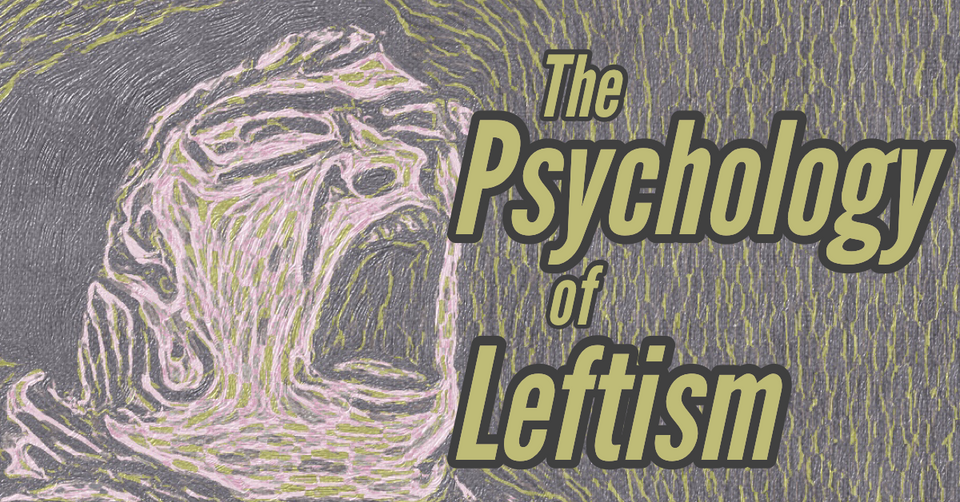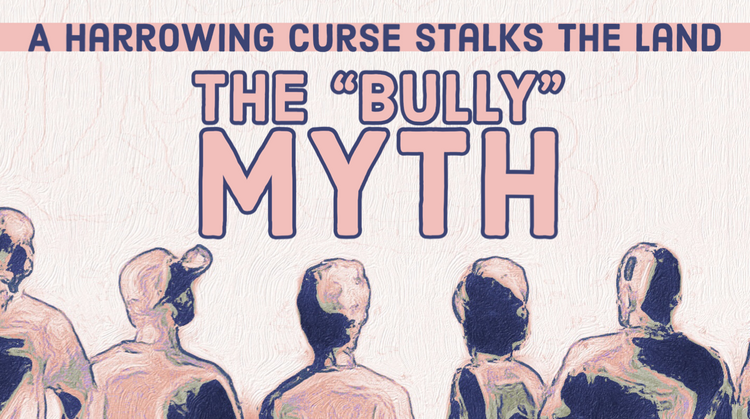The Conforming Mind | The Political Left

If both the left and the right believe in warfare sociology (conflict is the driving force of social development) but reject the solidarity of interests a that result in economic activity, then neither the left nor the right is any less collective than the other. Their collectiveness is simply based on differing psychological traits.
The warfare sociologist rejects the mutual agreement and the economic trade, however. He believes that a community of interests exists solely within ambiguously defined groups. That is, mutual interests only exist within defined groups and not between these groups (at least in the long term). After all, the leftist's plethora of victims may often work together to lower the status of another group via regulations and taxes, but once the paradigm has shifted, their very groups turn on one another after determining a new order of who to take from and to whom to give.
This is why leftists clamor for the Nanny State, which is one-half Welfare State to lift the underdogs up, and one-half Regulatory-and-Tax State to pull the top dogs down. 0
Despite the modern leftist being characterized as rebellious, he is among the most strict of conformists. Despite controlling many areas of research and academia, modern leftists consistently produce flawed papers. Despite having humanitarian goals, his policies tend to produce results counter to those goals, harming the groups that he aims to defend.
Is incompetence a feature of modern leftism, or does the left simply have overt agendas? How do we make sense of the modern leftist?
Collectivism (Group Identity)
The left is collective while the right is individualistic. Indeed, this can even be shown with a comparison of the extremes of the left versus the extremes of the right. Far-left extremism is due primarily to "affiliated" or collective attacks; while the latter is due primarily to "lone wolf" or solitary actors.[1]
I conducted a simple experiment on social media where I made this point and provided empirical analysis in support of it. Right-leaning audiences that engaged with my post were curious, asked questions, and examined the evidence for themselves. Left-leaning audiences took a hostile approach. The irony is lost on them when they nod their heads to any statement about far-right extremism, yet become hysterical with any statement about far-left extremism. The reason for this approach is because they are collective to such an extent that statements about their groups are considered personal, rather than as observations.
Leftists tend to define people with a group identity (collective) approach, rather than an individualistic (personality) approach. Group identity, a phenomenon where a person defines the self by the groups he/she belongs to, has an inverse relationship with individualism. In other words, they are mutually exclusive – the more of one results in less of the other. One cannot define the self entirely by collectivism and individualism.
Due to their collective nature and psychological ailments [see next section] leftists profoundly identify with groups that have a negative image (weak, conquered, or unacceptable), even when the leftist is the source of that negative image. It is the leftist's inferiority complex that leads to association with such groups. They believe these groups are inferior; hence, their sympathy. In other words, the leftist projects his own inferiority onto groups so that he can belong to a group and feel powerful, since he does not feel powerful as an individual.
An obvious example of this phenomenon is the narratives to portray women as athletic as men. The feminist-leftist is clearly afflicted by a persistent belief that women are inferior in some way, and overcompensates for this belief with desperate narratives to prove the contrary. Clearly the leftist is afflicted with some inner belief that women are inferior to men and then attempts to overcompensate for the feelings of guilt of this belief by irrationally portraying women as dominant.
Collectivism is only part of those psychological needs, and is not enough by itself to define what a modern leftist is.
Critical Shame
Simply put, shame results from negative social interactions, or vice versa. Shame is a natural part of social dynamics. It is taught to us, reinforced to us as children so that we can exist in society productively and peacefully, but it can be taken too far or not far enough. The list of social rules in any society is impossible to follow precisely, so healthy individuals rationalize what norms to follow and what norms not to follow. In other words, healthy people are susceptible to shame but are still individuals.
If the process of socializing a child is taken too far, critical shame occurs where a person can exist in a permanent state of shame with incessant feelings of inadequacy.
Symptoms of shame:
- Depression – Since leftists are far more critically ashamed of themselves than other groups, significantly more left-leaning people report depression than right-leaning people.
- Despair and Feelings of Hopelessness – To avoid shame, the leftist has to conform to an impossible list of rules and norms. Since they have to lead such conforming and restrictive lives, they succumb to feelings of powerlessness.
- Feelings of Inadequacy or Low Self-Esteem – Shame is ultimately an irrational emotion associated with negative evaluation of the self. Critical levels of shame will produce incessant feelings of inadequacy.
- Conformity – generally, the more prone to shame a person is, the more conforming. As we will discuss later, the leftist is a strict conformist.
On one hand, shame in moderation is healthy and acts as an enforcer of mutually beneficial social exchanges. In other cases, shame and feelings of inadequacy (without collectivism) will result in people that take on arrogant and competitive personas to hide their flaws. However, these people still view themselves as autonomous and capable, so they are not leftists. The leftist differs radically from these people because leftists have entirely given up on the idea of individualism – competence, autonomy, and competition.
When we combine collectivism with critical shame and feelings of inadequacy, the leftist is produced. The leftist is not confident and does not pretend to be. The leftist even goes so far as to reject the idea of discourse, often claiming that he/she is "bad at debating," which is a common sentiment of left-leaning content creators. The real reason for the rejection of discourse is because it is competitive and usually undertaken by oneself as an individual. The insecure leftist hates competition and individualism. He rejects the idea of competition, because it highlights his feelings of inadequacy. He does not even feign competence because he does not view the self as a competing individual, but part of a collective.
These ideas are highly prevalent in leftist academia. Leftist philosophers and social scientists reject objectivity and reason. Reason and the scientific method oppose the appeal to authority fallacy that the leftist is so fond of using. The principles of reason and objectivity also supersedes group narratives and subjective storytelling, which the leftist relies on as a collectivist. Reason places power in the hands of capable individuals (and out of the hands of institutional credibility), so the leftist must reject it. The leftist does not believe in him/herself as a competent autonomous being capable of doing meaningful things without being a part of a group. Anything that reminds the leftist of strength and individuality will evoke feelings of inadequacy, which is why the leftist hates Western societies, though those reasons will never be admitted to.
The leftist only feels strong when part of a collective group, which is precisely why the leftist will often contrive groups and imagine enemies of those groups. This combination satisfies his need to be part of a group and his psychological need to feel powerful (because the group is solving a problem, albeit an imagined problem). Feeling powerful is important for anyone suffering from feelings of inadequacy and shame, which is a near-constant state for the leftist.
The trope of the leftist as a self-loather is accurate. In fact, the leftist measurably uses smaller words when talking to minorities despite claiming that everyone else is racist. Self-loathing is really a manifestation of the critical shame and its symptoms. The leftist lacks the confidence and sense of individuality to solve problems. He has no need for reason, which is why his tactics online turn into nasty ad hominem attacks, and why he turns academic discussions into group warfare – because, inevitably, something undesirable will be said about a group he belongs to. Since he rejects the philosophy of individualism, he relies on the state/institution to solve problems and care for his needs. The answer to problems is always state intervention or intervention from a dominant institution.
How does the leftist cope with critical shame?
Whenever a leftist refers to society as an evil "system" or "patriarchy", he is substituting his own feelings of inadequacy, despair, and hopelessness with an imaginary villain. Remember that anyone who suffers from critical shame has such a deep psychological need to conform that all societies will feel overbearing.
The fault must be in the "system" rather than him. It may even seem contradictory that he looks to the system to solve his problems while condemning the system. Yet this makes sense if the leftist is a collectivist suffering from critical shame. The leftist has a need to feel powerful and rebel, but lacks the confidence and competence to do so. As a result, he can only "rebel" against structures that are safe to rebel against (won't harm him). This way, he remains safe while satisfying his psychological needs to feel powerful.
To escape the feelings of a restrictive society due to critical levels of shame, leftists have to form group collectives that pretend to rebel. The leftist only feels powerful when a part of a group, and only overcomes critical shame when pretending to rebel. But recall that the leftist is highly conforming (a product of shame), so true rebellion is not actually possible for his psyche. However, feelings of rebellion are possible for people that don't have the autonomy to rebel. As a result of being a strict conformist and a collectivist, the leftist can only defend traditional principles in a perverted fashion. The leftist is a strict traditionalist outwardly, while being an insecure radical inwardly.
In fact, whenever a leftist "rebels," they do so in defense of a commonly accepted principle of the society, such as equality, economic aid to the poor, anti-animal cruelty, and reason ("science"). The society itself cares about these principles and is even built on some of them, so by the leftist's standards, everyone should be a leftist – unless the leftist's true agenda is against those principles. Ultimately when rebelling, the leftist imitates a widely accepted principle of society and then accuses society of not following that principle. Despite leftist hatred of the West, he has to defend these principles because he is too weak to properly rebel or be honest about his motives. He is simply too conforming (shamed), not autonomy (individualism), and lacks confidence (feelings of inferiority).
Since he rejects reason and objective truth that does not align with his motives, any analysis from him is bound to be flawed. Even the Black Lives Matter movement explicitly rejects objective truth, but when the leftist is confronted about this, he avoids the topic, often aggressively.
He has to join a group to not feel like a loser, and he has to take up a cause feel powerful...but he is not powerful since he rejects the tools of powerful individualism. Given these specific requirements and his pathological needs, the causes that he takes up have to be based on flawed or unscientific premises. This is why he appears untrustworthy.
The public is right to question the sincerity and credibility of the leftist. The public distrust of the left comes from the fact that these "rebellions" are built on false premises – otherwise, they would be true rebellions, which the conforming leftist is incapable of. He abhors any argument or evidence that his movement is illegitimate, because his psychological needs require the movement.
This psychological need is evidenced from the fight for mental health, namely the symptoms that the leftist suffers from, such as depression and low self-esteem. Ironically, leftists are the groups that attached the negative connotation to these words to begin with; yet it is a connotation that leftists themselves are fighting against. Contrive a foe, then defeat the foe. The leftist's causes are never-ending because the underlying psychology will always require them.
Another example of this phenomenon of imagining or being the villain they aim to fight, is with politically correct (PC) culture. The average "victim" that the leftist aims to protect is not the demographic that is hyper-sensitive to specific uses of language. Those most sensitive tend to be liberal white people who are not the "victims" themselves. These left-leaning people create a narrative of hostile language that is discriminatory and bigoted. The leftist is the source of this imaginary foe, and the leftist is the hero come to save these "victims" from it. Note that he only takes up causes that a collective community can be built around. Fake rebellion and superficial community.
Reason is secondary. He needs distraction from inner shame, solitude, and feelings of inadequacy. As soon as one cause is ended, another must be picked up.
As further examples of leftist hypocrisy and incompetence, modern welfare policies cause the poor to remain poor. Minimum wage policies decrease the prosperity of the working class that it aims to help. Equity measures decrease fairness at universities. Politically correct policies harm the scientific method of research institutions. Black Lives Matter (which believes in the conspiracy of systemic racism), is built on the racist critical theories and critical race theories, which also happen to be collectivist theories. And on and on.
A critical eye can point out that occasionally, leftists do rebel against mainstream principles. However, these "rebellions" are always in terms of other mainstream principles. A prime example of this phenomenon is with vaccine narratives, where the left contrives of a victimized group that is being placed in danger by contaminated zealots that refuse to take the vaccine. Even though equality suffers, they use another mainstream principle, reason, or "science", as the basis for the narrative. Since leftists have an inner need to feel powerful because they suffer from low self-esteem, their causes can quickly turn authoritarian, such as the police state that is forming in certain Australian communities among many other contemporary examples. Historically, leftist policy has tended to lead to authoritarianism and even totalitarianism; so in that regard, leftism has been quite predictable in its trajectory.
As an example of how accurate this bottom-up psychological framework is, let's test it on institutional leftist media. Is their propaganda always in terms of mainstream principles? Yes – equality, accountability, anti-violence, and reason are examples of the principles that leftist media attempt to frame propaganda around. Are collective narratives used in the propaganda? Of course – the BLM narratives are disseminated across institutional leftist media, along with feminist myths, and others. Is "rebellion" against the system a feature of the propaganda? Undoubtedly – as evidenced from the "protests" leading up to the election. Is there a general tendency of leftist media to attack the West and anyone/anything who embodies the philosophy of the individual? One needs to look no further than the incessant appeals to authority, which don't rely on reason and debate – tools of the competent individual.
The leftist is insecure and shamed, to the point of being defeated – he no longer views himself as an individual. Leftist media is a form of therapy for him, where his shame can be ameliorated, collectivism can serve as a proxy for a lack of personality, and a false sense of power can temporarily mend his feelings of inferiority. He hates individualism, competence, reason, and health – anything that he is not, though he cannot admit this. He is dishonest about his psychological needs and possibly unaware of them. He has to conform due to shame; rebel due to feelings of inadequacy; and needs to be a member of an activist group to feel powerful and fulfilled.
It is no wonder that he frames his goals in terms of Western principles while having anti-Western results. It is no wonder why he accuses society of not following a principle that members of that society do follow, so that he can introduce principles that members of that society don't follow.
Author's Note
Note that I have defined "leftist" with a bottom-up approach; hence, the psychology of the leftist. A top-down approach would have to take a more holistic definition of leftism by observing left-leaning policies and movements, despite many of them appearing to be inconsistent with one another, or even themselves.
Also, the world of policy is more complex than the psychology of a single group of people. To completely describe leftism, we have to consider enablers of leftists, which comprise of the non-left groups that align with leftists for corporate, political, or other special interests. We would also have to consider the non-left free-rider groups that would benefit from leftist policies, such as the poor who would benefit from less regulated welfare. This article is dedicated specifically to the psychology of the leftist.
a A solidarity of interests between disparate people is precisely how we come to agreements on the value between disparate goods after all. This follows from people's subjective valuation of goods/services. How else could we exchange a book for a non-book (a can of paint or an hour of carpentry or even money)? Someone has to value one thing more than the other and vice versa; and it is these very differences in individual valuations and individual ends that make people disparate themselves (i.e. individuals). Thus, the economic trade does not unite people despite their differences, but unites them due to their differences!
Of course, it helps when people (chiefly the successful entrepreneur) can predict another's disparateness (their own individual means and ends). To an extent, all intelligent social beings are capable of this.
0 Dan Sanchez. "Identity Politics and Warfare Sociology: The Who, the Whom, and the What". Essays by Dan Sanchez. Medium.
1 Institute for Economics and Peace. "Global Terrorism Index 2019 Measuring the Impact of Terrorism."

![A Religion Called "Psychology" & the Bully Myth [Part II]](/content/images/size/w750/2022/10/bully2.PNG)




Member discussion